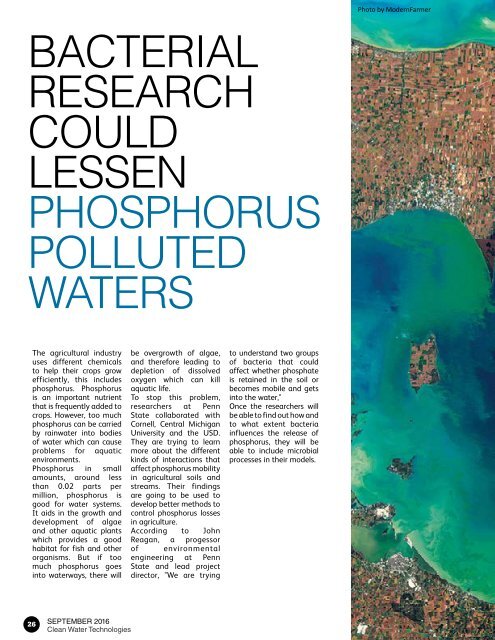GineersNow Engineering Magazine September 2016 Issue No 007
GineersNow Engineering Magazine September 2016 Issue No 007 Veolia Water Technologies: Sustainable water champion. Exclusive: Water for people, Cranfield University, Imagine H2O, WaterAid, Aviscus. Special Feature Stories: Desalination, Nanofiltration, Ultrafiltration, Reverse Osmosis, Water Treatment, Pipes, Pumps, HVACR, Oil & Gas, Construction, Heavy Equipment, Machinery, Tools, Civil Engineering, Mechanical, Electrical, Plumbing, MEP, Water, Wastewater, Renewables, Energy, Petroleum. Country Focus: Brazil, United States, UAE, Saudi Arabia, Qatar, Bahrain, Kuwait, Oman, United Kingdom, Singapore, Hong Kong, Philippines, Malaysia, Indonesia, India, Australia More engineering stories at https://www.gineersnow.com/topics/magazines
GineersNow Engineering Magazine September 2016 Issue No 007
Veolia Water Technologies: Sustainable water champion.
Exclusive: Water for people, Cranfield University, Imagine H2O, WaterAid, Aviscus.
Special Feature Stories: Desalination, Nanofiltration, Ultrafiltration, Reverse Osmosis, Water Treatment, Pipes, Pumps, HVACR, Oil & Gas, Construction, Heavy Equipment, Machinery, Tools, Civil Engineering, Mechanical, Electrical, Plumbing, MEP, Water, Wastewater, Renewables, Energy, Petroleum.
Country Focus: Brazil, United States, UAE, Saudi Arabia, Qatar, Bahrain, Kuwait, Oman, United Kingdom, Singapore, Hong Kong, Philippines, Malaysia, Indonesia, India, Australia
More engineering stories at https://www.gineersnow.com/topics/magazines
Create successful ePaper yourself
Turn your PDF publications into a flip-book with our unique Google optimized e-Paper software.
Photo by ModernFarmer<br />
BACTERIAL<br />
RESEARCH<br />
COULD<br />
LESSEN<br />
PHOSPHORUS<br />
POLLUTED<br />
WATERS<br />
The agricultural industry<br />
uses different chemicals<br />
to help their crops grow<br />
efficiently, this includes<br />
phosphorus. Phosphorus<br />
is an important nutrient<br />
that is frequently added to<br />
crops. However, too much<br />
phosphorus can be carried<br />
by rainwater into bodies<br />
of water which can cause<br />
problems for aquatic<br />
environments.<br />
Phosphorus in small<br />
amounts, around less<br />
than 0.02 parts per<br />
million, phosphorus is<br />
good for water systems.<br />
It aids in the growth and<br />
development of algae<br />
and other aquatic plants<br />
which provides a good<br />
habitat for fish and other<br />
organisms. But if too<br />
much phosphorus goes<br />
into waterways, there will<br />
be overgrowth of algae,<br />
and therefore leading to<br />
depletion of dissolved<br />
oxygen which can kill<br />
aquatic life.<br />
To stop this problem,<br />
researchers at Penn<br />
State collaborated with<br />
Cornell, Central Michigan<br />
University and the USD.<br />
They are trying to learn<br />
more about the different<br />
kinds of interactions that<br />
affect phosphorus mobility<br />
in agricultural soils and<br />
streams. Their findings<br />
are going to be used to<br />
develop better methods to<br />
control phosphorus losses<br />
in agriculture.<br />
According to John<br />
Reagan, a progessor<br />
of environmental<br />
engineering at Penn<br />
State and lead project<br />
director, "We are trying<br />
to understand two groups<br />
of bacteria that could<br />
affect whether phosphate<br />
is retained in the soil or<br />
becomes mobile and gets<br />
into the water,"<br />
Once the researchers will<br />
be able to find out how and<br />
to what extent bacteria<br />
influences the release of<br />
phosphorus, they will be<br />
able to include microbial<br />
processes in their models.<br />
26<br />
SEPTEMBER <strong>2016</strong><br />
Clean Water Technologies


















